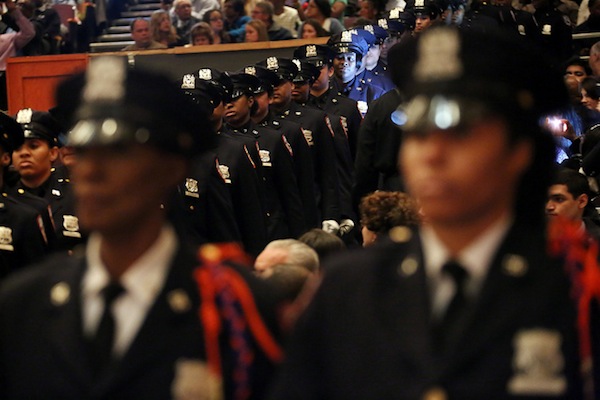
Photo by: Office of the Mayor
Corrections cadets at a graduation ceremony during the Bloomberg administration.
In most occupations, you most often encounter three types of people: Those who want to lead (and may be able to do so effectively), those who think they can lead (but can’t), and those who choose to follow. As cream rises to the top and people who are best suited move into leadership positions, those who remain as before may create situations in the workplace that can best describe as unnecessary drama.
This summer, New York City was transfixed by allegations of systematic brutality on Rikers Island. Blame for the problem has been assigned to individual officers, poor policies, constrained funding and more. But not enough attention has been given to the crucial role of jail leadership.
New York City has some 7,900 correction officers in the jails on Rikers Island and other lockups in the boroughs. Those facilities are overseen by 19 wardens, 41 deputy wardens, and 104 assistant deputy wardens. But the crucial layer of leadership between these administrators and the rank-and-file are the 790 captains in the department.
Promoted after taking a civil service examination and passing a broader review, making a minimum salary of $77,000, correction captains are the equivalent of police sergeants and fire lieutenants: They are the first layer of leadership in a paramilitary force, the immediate supervisor over decisions that affect the lives and health of their own personnel and the public they serve.
In corrections, more often than not, captains were once a peer to the officers s/he must now supervise. What was once glossed over as acceptable behavior when two officers reviewed their day on the job in a local pub may now be recognized as cause for disciplinary action when one of those officers becomes the boss.
Corrections captains essentially walk a tightrope every day and several factors are required to keep them in balance. They need to fully comprehend the value and importance of their position. Essentially, all eyes turn to him/her for direction. Therefore they should always be prepared to practice everything they preach.
Just as a parent takes on many other roles to keep a household afloat, the correction captain is also a mentor and teacher with the main goal of keeping peace, reducing stress/tension in the facility, effectively dealing with the many challenges that are bound to arise, and ensuring the safety of his/her staff and inmates.
Refining conflict negotiation/resolution techniques is a vital element of daily life in the facility. Captains must always display rational and appropriate behavior. They must teach their officers “the law of corrections,” as documented in the facility’s policy and procedures manuals (standard operating procedure). They also need to teach by example and actively teach techniques for avoiding common pitfalls on the job (e.g., being baited into losing temper, becoming apathetic, going through the motions instead of committing to the moment, etc.).
With such a mighty list of responsibilities, the challenges are greatly increased when directing former beer buddies to “follow the company line.” Captains must change the way they relate to their staff—not necessarily doing a 360 from friend to dictator overnight–but find a balance in their new role as “boss” while remaining personable, approachable, and accessible.
Newly assigned captains have the upper hand in these situations more than they realize: They are likely to know the personalities of their subordinates much better than someone new to the facility and are better able to distinguish who is suited for particular assignments. Most importantly, they know how it feels to be on both sides of the desk. They have the advantage and should feel empowered as a result.
Generally captains must suitably distinguish the necessity for legal, reasonable use of force by staff during inmate incidents and determine whether staff actions are necessary or when it’s more excessive, retaliatory, or a result of anger. To be taken seriously, they must follow through when the disciplinary behavior toward inmates and/or staff is warranted.
Whatever scenarios had once been considered “par for the course,” “part of the job,” “inconsequential,” or within the confines of “a blue wall of silence” must now be viewed from a totally new vantage point. As the captain, reason must win out and the repercussions must be considered before sweeping incidents under the rug and hoping the dirt doesn’t surface. There is a line drawn between the acceptable and unacceptable and on s/he stands square upon it.
A supportive administration is crucial to a captain’s success. Where there is dysfunction, there is usually a lack of direction, cooperation, and/or disinterest from those to whom the captain must turn when issues arise. The facility itself needs to be adequately staffed, with regulations and directives designed to operate on a proactive (preventive) versus reactive basis.
Facility overcrowding has historically been documented to increase disharmony, tension and stress among both inmates and staff. Inmates should be appropriately segregated and classified according to age, severity of crime, frequency of imprisonment, gang affiliations, etc. (For example, a first-timer convicted of marijuana possession shouldn’t be housed with hardcore murderers or frequently convicted felons.)
There should be resources accessible for inmates to be protected from dangerous situations, people or treatment (whether from fellow inmates or staff), and optimally, enough resources to achieve rehabilitation (e.g., education, alcohol/drug counseling, vocational training/guidance, etc.), to reduce their potential for recidivism.
Even with these policies and supports in place, the captain’s move from buddy to boss is a two-way street and not every subordinate is going to go with the switch. There is bound to be some dialogue among subordinates dissing the transition, especially by those who are jealous or petty.
But there is little that the captain can do about this and must not get caught up in the blather. It is a chance to practice what they are preaching and not get baited. Take the reins, take the job seriously, be fair to all, and leave the nonsense behind.








